Unit 1SectionA3a-3b课件 人教版英语九年级全册(21张PPT)
文档属性
| 名称 | Unit 1SectionA3a-3b课件 人教版英语九年级全册(21张PPT) | 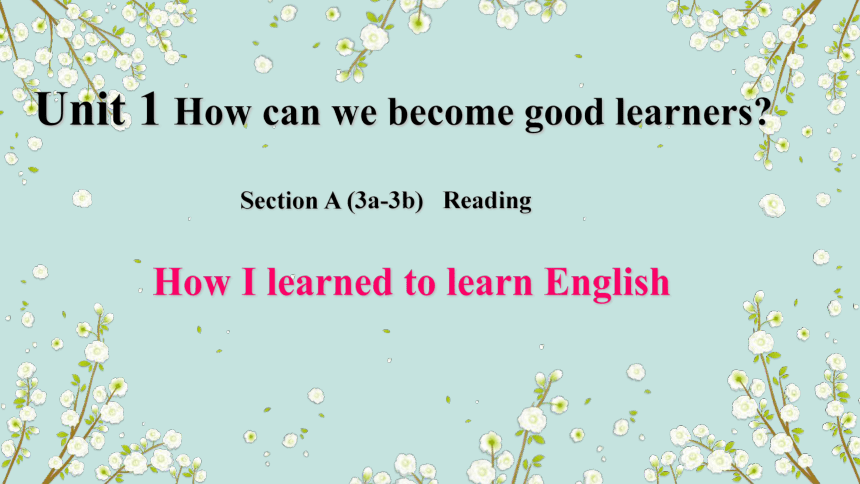 | |
| 格式 | pptx | ||
| 文件大小 | 1.9MB | ||
| 资源类型 | 教案 | ||
| 版本资源 | 人教新目标(Go for it)版 | ||
| 科目 | 英语 | ||
| 更新时间 | 2023-07-16 08:58:54 | ||
图片预览

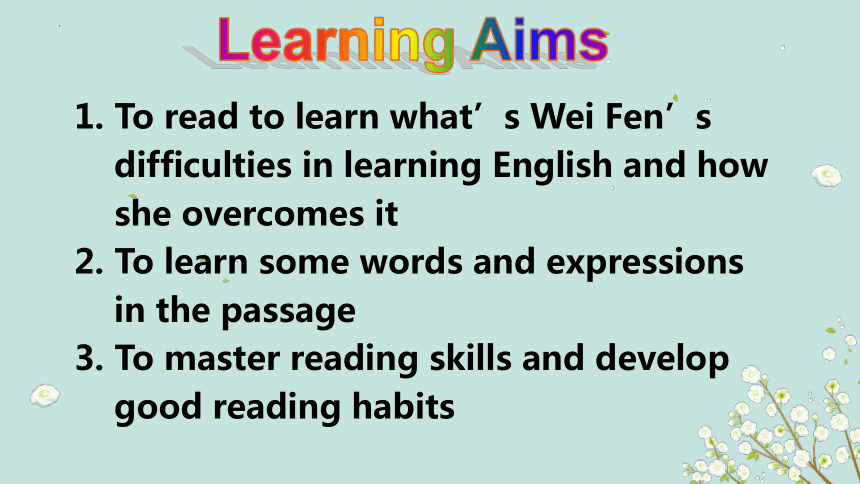
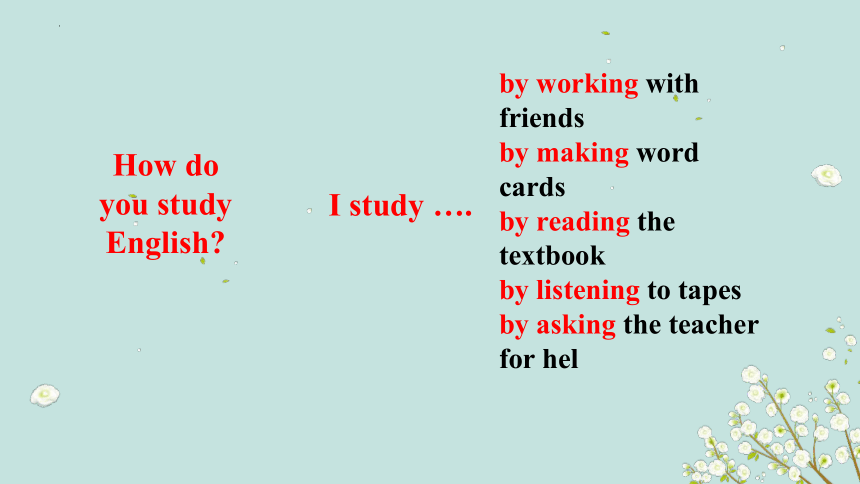
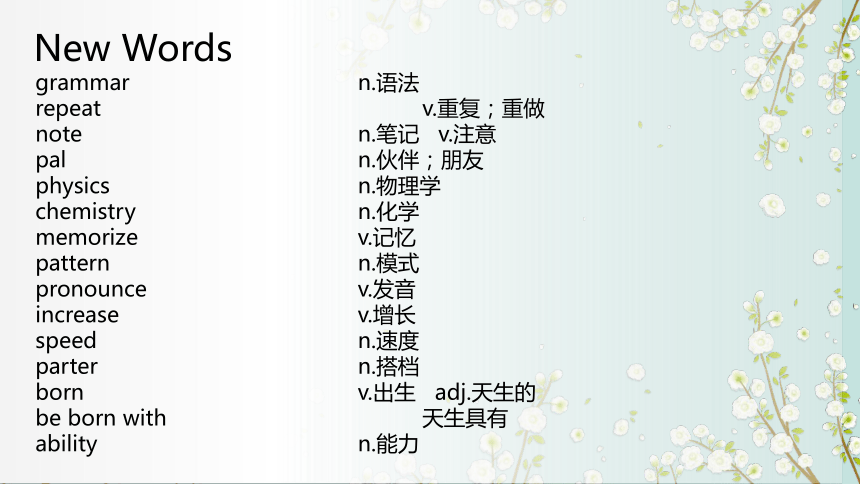
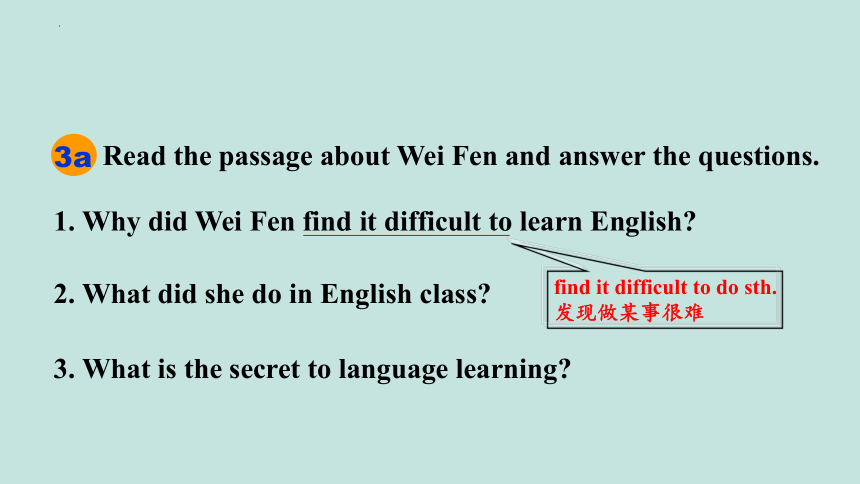
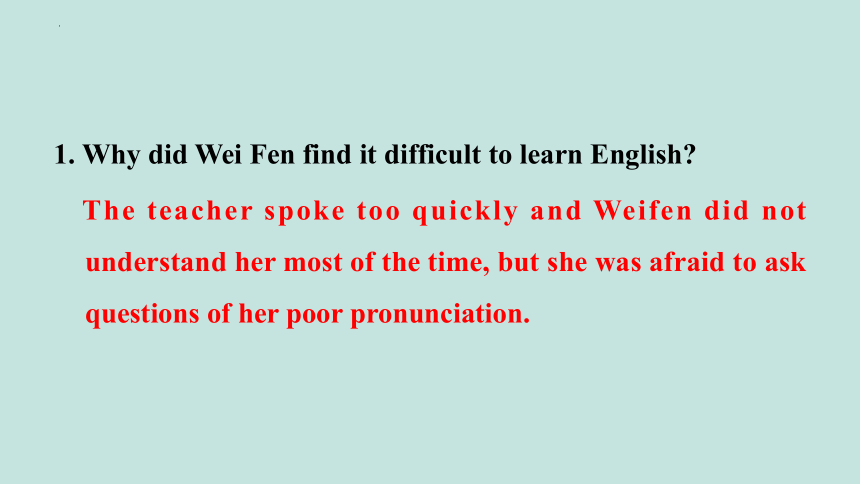

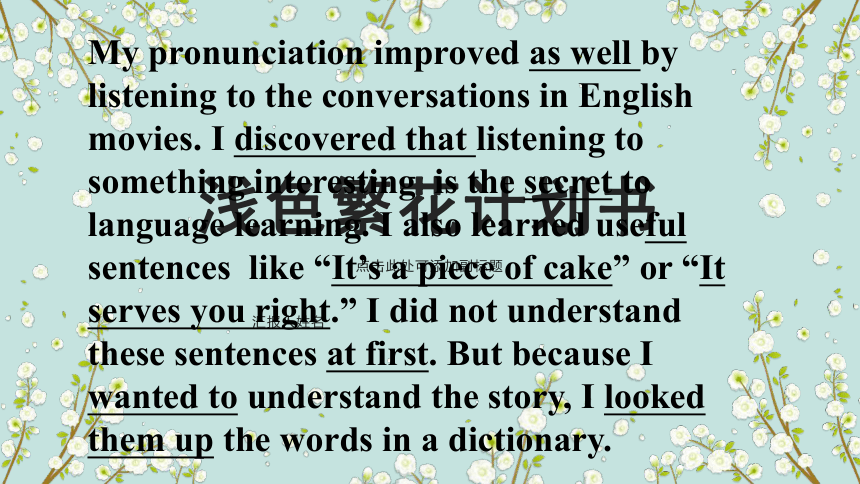
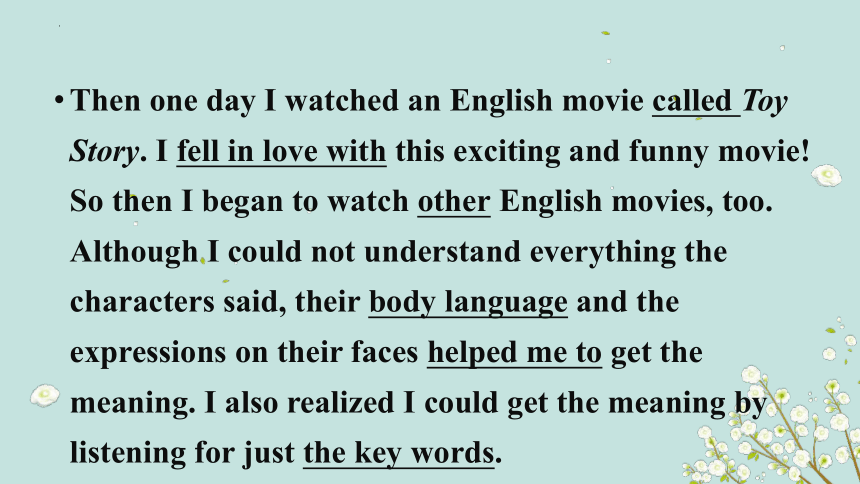
文档简介
(共21张PPT)
Unit 1 How can we become good learners
Section A (3a-3b) Reading
How I learned to learn English
Learning Aims
1. To read to learn what’s Wei Fen’s
difficulties in learning English and how
she overcomes it
2. To learn some words and expressions
in the passage
3. To master reading skills and develop
good reading habits
by working with friends
by making word cards
by reading the textbook
by listening to tapes
by asking the teacher for hel
How do you study English
I study ….
New Words
grammar n.语法
repeat v.重复;重做
note n.笔记 v.注意
pal n.伙伴;朋友
physics n.物理学
chemistry n.化学
memorize v.记忆
pattern n.模式
pronounce v.发音
increase v.增长
speed n.速度
parter n.搭档
born v.出生 adj.天生的
be born with 天生具有
ability n.能力
Read the passage about Wei Fen and answer the questions.
1. Why did Wei Fen find it difficult to learn English
2. What did she do in English class
3. What is the secret to language learning
_______________________
find it difficult to do sth.
发现做某事很难
3a
1. Why did Wei Fen find it difficult to learn English
The teacher spoke too quickly and Weifen did not understand her most of the time, but she was afraid to ask questions of her poor pronunciation.
3. What is the secret to language learning
2. What did she do in English class
She hid behind her textbook and never said anything.
For Wei Fen, the secret to language learning is listening to something interesting.
浅色繁花计划书
点击此处可添加副标题
汇报人姓名
My pronunciation improved as well by listening to the conversations in English movies. I discovered that listening to something interesting is the secret to language learning. I also learned useful sentences like “It’s a piece of cake” or “It serves you right.” I did not understand these sentences at first. But because I wanted to understand the story, I looked them up the words in a dictionary.
Then one day I watched an English movie called Toy Story. I fell in love with this exciting and funny movie! So then I began to watch other English movies, too. Although I could not understand everything the characters said, their body language and the expressions on their faces helped me to get the meaning. I also realized I could get the meaning by listening for just the key words.
My pronunciation improved as well by listening to the conversations in English movies. I discovered that listening to something interesting is the secret to language learning. I also learned useful sentences like “It’s a piece of cake” or “It serves you right.” I did not understand these sentences at first. But because I wanted to understand the story, I looked them up the words in a dictionary.
1.find it + adj. + to do sth.
find it + adj. + to do sth.意为“认为做某事.......”
这里的it是形式宾语,真正的宾语是to do sth.
具有这样类似的结构还有:
think it + adj. + to do sth.
make it + adj. + to do sth.
feel it + adj. + to do sth.
【find用法归纳】
find sb. doing sth. 发现某人做某事
find it + adj. + to do sth. 发现做某事很……
其中it是形式宾语, 形容词做宾补, to do sth.是真正的宾语。同类的词还有think, feel, consider等。
2. so ... that“如此……以至于”,引导结果状语从句。so修饰形容词或副词。常见结构:
① so+形容词 / 副词+that从句;
② so+形容词+a(n)+单数可数名词+that从句。
such和so的区分
so…that与such…that之间的转换既为 so与such之间的转换。
so和such的区别是:
⑴ so修饰形容词或副词, such修饰名词。
e.g. My brother runs so fast that I can’t follow him.
我弟弟跑得那么快以至于我跟不上他。
He is such a boy. 他是一个这样的孩子。
⑵ so修饰的形容词后可以有一个单数的可数名词,其结构是“so+形容词+a/an+可数名词单数”。
3.But I was afraid to ask questions because of my poor pronunciation.
be afraid to do sth 害怕/不敢做某事
be afraid of doing sth 害怕做某事(担心出现不良后果)
be afraid +that 从句 恐怕·········(令人遗憾或不好的事情)
4.as well/also/either/too
①as well意为“也”,在口语中使用很多,和too可以互换,通常用于句末,不用逗号隔开。
②also用于肯定句,常位于be动词、助动词或情态动词之后,行为动词之前,不用于句末。
③too用于肯定句,比also更通俗,和as well可以互换,常放在句末,并用逗号隔开。
④either用于否定句中,而且只能放于句末。
5. discover v. 发现; 发觉
指偶然或经过努力发现原来客观存在但不为人所知的事物。
e.g. Columbus discovered America in 1492.
invent v. 发明
通过劳动运用聪明才智“发明/创造”出以前从未存在过的新事物。
e.g. Edison invented the electric light.
6.look up (词典、参考书或电脑)查阅时,其宾语可为名词(短语)或代词。当宾语为名词(短语)时,该名词(短语)可位于up之后,也可位于look和up之间;当其宾语为代词时,该代词位于look和up之间。
e.g. You can look up a new word / look a new word up in the dictionary.
If you don’t know the word, you can look it up in the dictionary.
look up (在词典、参考书中)查阅; 抬头看
look after 照顾 look like 看起来像
look out 小心 look for 寻找
look through 通过 look over 检查
look forward to 期望 look around 四处看看
have a look 看一看
1. I can understand the meaning by watching their _____________and the___________ on their faces.
2. I can get the meaning by listening for just the___________ .
3. My pronunciation improved by listening to the ______________ in English movies.
Complete the sentences with what Wei Fen learned from watching movies. Use words and phrases from the passage.
body language
expressions
key words
conversations
3b
4. I learned ______sentences like “It’s a piece of cake” by watching the movies.
5. I can find the meaning of new words by looking them up in a __________.
useful
dictionary
浅色繁花计划书
点击此处可添加副标题
汇报人姓名
1. 大部分时间
2. 发现做某事很难
3. 语言学习的秘密
4. 害怕做某事
5. 爱上
6. 肢体语言
7. 脸上的表情
8. 关健词
9. 对……感兴趣
10. 查字典
11. 帮助某人做某事
12. 起初
13. 更好地理解……
most of the time it difficult to do sth.
the secret to language learning
be afraid to do sth.
fall in love with
body language
the expressions on the faces
key words
be interested in
look up the word in the dictionary
help sb. (to) do sth.
at first
have a better understanding of…
1. The foreigner spoke ______ quickly ______ I could hardly understand him.
A. too; to B. such; that
C. so; that D. very; that
2. —______did you tell her about the news
—By sending an e-mail.
A. What B. Why C. When D. How
C
D
Unit 1 How can we become good learners
Section A (3a-3b) Reading
How I learned to learn English
Learning Aims
1. To read to learn what’s Wei Fen’s
difficulties in learning English and how
she overcomes it
2. To learn some words and expressions
in the passage
3. To master reading skills and develop
good reading habits
by working with friends
by making word cards
by reading the textbook
by listening to tapes
by asking the teacher for hel
How do you study English
I study ….
New Words
grammar n.语法
repeat v.重复;重做
note n.笔记 v.注意
pal n.伙伴;朋友
physics n.物理学
chemistry n.化学
memorize v.记忆
pattern n.模式
pronounce v.发音
increase v.增长
speed n.速度
parter n.搭档
born v.出生 adj.天生的
be born with 天生具有
ability n.能力
Read the passage about Wei Fen and answer the questions.
1. Why did Wei Fen find it difficult to learn English
2. What did she do in English class
3. What is the secret to language learning
_______________________
find it difficult to do sth.
发现做某事很难
3a
1. Why did Wei Fen find it difficult to learn English
The teacher spoke too quickly and Weifen did not understand her most of the time, but she was afraid to ask questions of her poor pronunciation.
3. What is the secret to language learning
2. What did she do in English class
She hid behind her textbook and never said anything.
For Wei Fen, the secret to language learning is listening to something interesting.
浅色繁花计划书
点击此处可添加副标题
汇报人姓名
My pronunciation improved as well by listening to the conversations in English movies. I discovered that listening to something interesting is the secret to language learning. I also learned useful sentences like “It’s a piece of cake” or “It serves you right.” I did not understand these sentences at first. But because I wanted to understand the story, I looked them up the words in a dictionary.
Then one day I watched an English movie called Toy Story. I fell in love with this exciting and funny movie! So then I began to watch other English movies, too. Although I could not understand everything the characters said, their body language and the expressions on their faces helped me to get the meaning. I also realized I could get the meaning by listening for just the key words.
My pronunciation improved as well by listening to the conversations in English movies. I discovered that listening to something interesting is the secret to language learning. I also learned useful sentences like “It’s a piece of cake” or “It serves you right.” I did not understand these sentences at first. But because I wanted to understand the story, I looked them up the words in a dictionary.
1.find it + adj. + to do sth.
find it + adj. + to do sth.意为“认为做某事.......”
这里的it是形式宾语,真正的宾语是to do sth.
具有这样类似的结构还有:
think it + adj. + to do sth.
make it + adj. + to do sth.
feel it + adj. + to do sth.
【find用法归纳】
find sb. doing sth. 发现某人做某事
find it + adj. + to do sth. 发现做某事很……
其中it是形式宾语, 形容词做宾补, to do sth.是真正的宾语。同类的词还有think, feel, consider等。
2. so ... that“如此……以至于”,引导结果状语从句。so修饰形容词或副词。常见结构:
① so+形容词 / 副词+that从句;
② so+形容词+a(n)+单数可数名词+that从句。
such和so的区分
so…that与such…that之间的转换既为 so与such之间的转换。
so和such的区别是:
⑴ so修饰形容词或副词, such修饰名词。
e.g. My brother runs so fast that I can’t follow him.
我弟弟跑得那么快以至于我跟不上他。
He is such a boy. 他是一个这样的孩子。
⑵ so修饰的形容词后可以有一个单数的可数名词,其结构是“so+形容词+a/an+可数名词单数”。
3.But I was afraid to ask questions because of my poor pronunciation.
be afraid to do sth 害怕/不敢做某事
be afraid of doing sth 害怕做某事(担心出现不良后果)
be afraid +that 从句 恐怕·········(令人遗憾或不好的事情)
4.as well/also/either/too
①as well意为“也”,在口语中使用很多,和too可以互换,通常用于句末,不用逗号隔开。
②also用于肯定句,常位于be动词、助动词或情态动词之后,行为动词之前,不用于句末。
③too用于肯定句,比also更通俗,和as well可以互换,常放在句末,并用逗号隔开。
④either用于否定句中,而且只能放于句末。
5. discover v. 发现; 发觉
指偶然或经过努力发现原来客观存在但不为人所知的事物。
e.g. Columbus discovered America in 1492.
invent v. 发明
通过劳动运用聪明才智“发明/创造”出以前从未存在过的新事物。
e.g. Edison invented the electric light.
6.look up (词典、参考书或电脑)查阅时,其宾语可为名词(短语)或代词。当宾语为名词(短语)时,该名词(短语)可位于up之后,也可位于look和up之间;当其宾语为代词时,该代词位于look和up之间。
e.g. You can look up a new word / look a new word up in the dictionary.
If you don’t know the word, you can look it up in the dictionary.
look up (在词典、参考书中)查阅; 抬头看
look after 照顾 look like 看起来像
look out 小心 look for 寻找
look through 通过 look over 检查
look forward to 期望 look around 四处看看
have a look 看一看
1. I can understand the meaning by watching their _____________and the___________ on their faces.
2. I can get the meaning by listening for just the___________ .
3. My pronunciation improved by listening to the ______________ in English movies.
Complete the sentences with what Wei Fen learned from watching movies. Use words and phrases from the passage.
body language
expressions
key words
conversations
3b
4. I learned ______sentences like “It’s a piece of cake” by watching the movies.
5. I can find the meaning of new words by looking them up in a __________.
useful
dictionary
浅色繁花计划书
点击此处可添加副标题
汇报人姓名
1. 大部分时间
2. 发现做某事很难
3. 语言学习的秘密
4. 害怕做某事
5. 爱上
6. 肢体语言
7. 脸上的表情
8. 关健词
9. 对……感兴趣
10. 查字典
11. 帮助某人做某事
12. 起初
13. 更好地理解……
most of the time it difficult to do sth.
the secret to language learning
be afraid to do sth.
fall in love with
body language
the expressions on the faces
key words
be interested in
look up the word in the dictionary
help sb. (to) do sth.
at first
have a better understanding of…
1. The foreigner spoke ______ quickly ______ I could hardly understand him.
A. too; to B. such; that
C. so; that D. very; that
2. —______did you tell her about the news
—By sending an e-mail.
A. What B. Why C. When D. How
C
D
同课章节目录
- Unit 1 How can we become good learners.
- Section A
- Section B
- Unit 2 I think that mooncakes are delicious!
- Section A
- Section B
- Unit 3 Could you please tell me where the restroom
- Section A
- Section B
- Unit 4 I used to be afraid of the dark.
- Section A
- Section B
- Unit 5 What are the shirts made of?
- Section A
- Section B
- Review of Units 1-5
- Unit 6 When was it invented?
- Section A
- Section B
- Unit 7 Teenagers should be allowed to choose their
- Section A
- Section B
- Unit 8 It must belong to Carla.
- Section A
- Section B
- Unit 9 I like music that I can dance to.
- Section A
- Section B
- Unit 10 You're supposed to shake hands.
- Section A
- Section B
- Review of Units 6-10
- Unit 11 Sad movies make me cry.
- Section A
- Section B
- Unit 12 Life is full of the unexpected
- Section A
- Section B
- Unit 13 We're trying to save the earth!
- Section A
- Section B
- Unit 14 I remember meeting all of you in Grade 7.
- Section A
- Section B
- Review of Units 11-14
